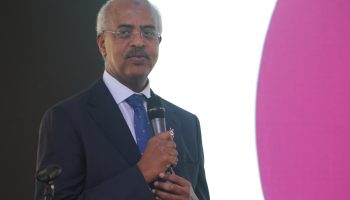- October 1, 2019
- Posted by: p mulee
- Category:
The United States says Kenya has to stop relying on foreign aid.
Kenya received Sh57 billion from the US government in 2017-18, which was reduced to Sh50 billion last year to the expected Sh37 billion this year for disease control.
Ambassador Kyle McCarter on Monday said every successful project should get smaller because of the fewer disease outbreaks reported in the country.
“That should be the direction we are going because we have greater success, we have fewer outbreaks, fewer people suffering and more people that are healthy and living a vibrant healthy life. That is what we want,” McCarter said.
He said this in a tour of the Centres for Disease Control and Prevention (CDC) in Kibera Research Centre and Tabitha Clinic in Kibera, Nairobi.
The ambassador said the country should not only judge things by dollars and cents but largely look at the potential Kenyans have.
“The greatest resource that comes from Kenya is its people. We give too much attention to the partners. The potential should come from what the Kenyan people have,” he said.
Kenya has received about Sh700 billion from Pepfar since it was founded 15 years ago and remains the programme’s largest beneficiary.
The US President’s Emergency Plan for Aids Relief (Pepfar) is the US government’s response to the global HIV/Aids epidemic. It has been supporting the provision and expansion of integrated TB and HIV/Aids care treatment services within Kibera since 2003.
Hundreds of Kenyans working for NGOs funded by the US government to do HIV-related work have been laid off following severe budget cuts.
The organisations were required to close numerous activities by October 1 when the budget cuts begin.
Pepfar, which funds most HIV activities in Kenya, has been cutting funding to Kenya since 2017.
Currently, in Kibera between 25,000 and 29,000 people are part of a health and demographic surveillance system that collects information every four months.
The Kibera Reach 90 Project seeks to improve prevention, care and treatment of HIV/Aids, sexually transmitted infections and related opportunistic infections including tuberculosis and initiating programmes to provide Anti-Retroviral Therapy (ART).
As of August, an average of 416 people in Kibera test for HIV/Aids monthly

















Hello, Neat post. There is a problem along
with your site in internet explorer, may check this?
IE still is the marketplace leader and a huge
component of other people will pass over your great writing due to this
problem.
Just want to say your article is as amazing.
The clearness on your submit is simply cool and that i can suppose you’re
a professional on this subject. Fine along with your permission let me to
take hold of your RSS feed to stay up to date with imminent post.
Thank you one million and please carry on the enjoyable work.
Thanks for sharing your thoughts on cbd oil. Regards
My brother suggested I might like this website.
He was entirely right. This post actually made my day.
You can not imagine simply how much time I had
spent for this information! Thanks!
This is the perfect website for everyone who hopes to find out about this
topic. You realize so much its almost tough
to argue with you (not that I personally will need to…HaHa).
You certainly put a new spin on a subject that’s been discussed for ages.
Wonderful stuff, just wonderful!
Hi! I could have sworn I’ve visited this web site before
but after browsing through many of the posts I realized it’s new to me.
Anyhow, I’m definitely delighted I stumbled upon it and I’ll be book-marking it and checking back often!
Thanks for sharing your thoughts. I truly appreciate your
efforts and I will be waiting for your next post thank you once again.
You really make it seem so easy with your
presentation but I find this matter to be really
something which I think I would never understand.
It seems too complicated and extremely broad for
me. I’m looking forward for your next post, I’ll try to get
the hang of it!
What’s Happening i am new to this, I stumbled upon this I’ve found It absolutely useful and it
has helped me out loads. I hope to contribute & help different
customers like its aided me. Good job.
I loved as much as you’ll receive carried out right here. The sketch is attractive, your authored material stylish.
nonetheless, you command get got an shakiness over that you wish be delivering
the following. unwell unquestionably come more formerly again as exactly the same nearly a
lot often inside case you shield this increase.
Hi there to every single one, it’s actually a fastidious for me
to go to see this web site, it includes helpful Information.
You’re so awesome! I do not suppose I’ve truly
read through something like that before. So great to find someone with some genuine thoughts on this topic.
Really.. thank you for starting this up. This site is one thing that is
needed on the web, someone with a bit of originality!
There’s certainly a great deal to know about this issue.
I love all of the points you made.
Hi friends, pleasant piece of writing and fastidious
arguments commented at this place, I am in fact enjoying by these.
I was suggested this web site by my cousin. I’m not sure whether this post is written by him as nobody else know
such detailed about my problem. You’re wonderful!
Thanks!
You made some decent points there. I checked on the web for additional information about the issue and found most
people will go along with your views on this web site.
Fantastic goods from you, man. I’ve understand your stuff previous to and you’re just extremely magnificent.
I really like what you have acquired here, certainly like what you are saying and the way in which you
say it. You make it enjoyable and you still care for to keep it sensible.
I can not wait to read far more from you. This is actually a tremendous web site.
Great blog! Do you have any helpful hints for aspiring writers?
I’m planning to start my own blog soon but I’m a little lost on everything.
Would you recommend starting with a free platform like WordPress or go for a paid
option? There are so many choices out there that I’m completely
confused .. Any recommendations? Many thanks! cheap flights 31muvXS
Great delivery. Sound arguments. Keep up the amazing spirit.
3aN8IMa cheap flights
I am extremely inspired together with your writing talents and also
with the layout on your weblog. Is that this a paid
topic or did you customize it your self? Either way
stay up the excellent high quality writing, it is rare to see a
great blog like this one nowadays..
Incredible points. Great arguments. Keep up the great effort.
Do you mind if I quote a few of your posts as long as I provide credit and sources
back to your weblog? My blog site is in the
very same niche as yours and my visitors would certainly benefit from a lot
of the information you provide here. Please let me know if this okay with you.
Appreciate it!
Wonderful post however , I was wanting to know if you could write a
litte more on this topic? I’d be very thankful if you could elaborate a little bit more.
Many thanks!
Hmm is anyone else having problems with the pictures on this blog loading?
I’m trying to determine if its a problem on my end or if it’s the blog.
Any suggestions would be greatly appreciated.
Incredible points. Sound arguments. Keep up the great work.